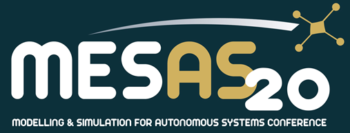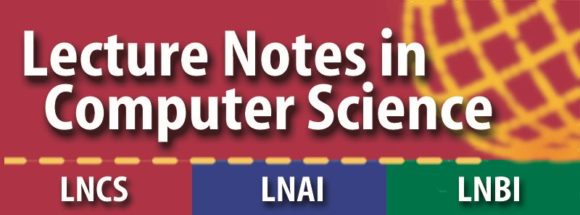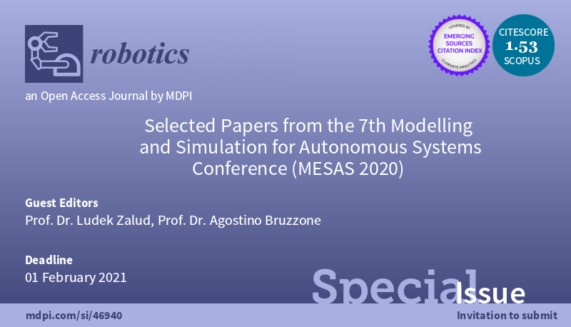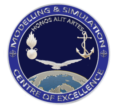- Autonomous Systems Strategy and Concept Development and Implementation in all Domains of Operation
- Advances in AI and its Impact on Future Operations
- The Role of the Robots and Foot Soldier in the Future Operations
- Security, Use of AxS as Lethal Instruments, Safety of Aviation
- Ethical, Psychological, Legal and Operational Aspects, CIMIC
- Cyber Security (in Context of AxS an their Applications)
- Autonomous Tactical Behavior
- Math Modelling and Simulation of AI Tasks
- RT Issue and Reality Gaps in Context of New AI Concepts, M&S of Future Operational Tasks
- Multi-robot Systems/Swarms, Benefits, Threats, and Challenges
- AI/machine-learning of the systems through M&S
- Distributed Control for Multi-robot Systems
- Robust Decision Making via Cooperative Estimation
- Relevant Concepts and Experiments
- Concepts and Visions of Future Warfare and Application
- M&S in Capability Evaluation of Robotic Swarms
- Co-simulation Tools for Multi-domain Analysis
- Effectiveness, Reliability, and Cyber-Security Issues
- Key Challenges of the Research and Development
- Capability Dev. in Context of Future Ops and Social Environment
- Man versus Computer, Advanced M&S Projects
- Future Technology and Impact on Society
- Validation and verification process for Autonomous functions (V&V via M&S)
ABSTRACTS AND REGISTRATION
Authors are requested to send abstracts (brief description about 200 words is sufficient, but not limited to, you could sent PDF with comprehensive description, drawings, architecture, algorithms and so on.) only via the MESAS20 LINK TO THE SPRINGER CONFERENCE SERVICE SYSTEM.
FULL PAPER TEMPLATE AND COPYRIGHT
When submitting the full paper (based on Abstract approval) via  Springer OCS system, please use the following instruction and templates requested by LNCS Series Producer and author’s guidelines and use their proceedings templates, either for LaTeX or for Word for the preparation of their papers. Springer encourages authors to include their ORCIDs in their papers. In addition, the corresponding author of each paper, acting on behalf of all of the authors of that paper, must complete and sign a Consent-to-Publish form. The corresponding author signing the copyright form should match the corresponding author marked on the paper. Once the files have been sent to Springer, changes relating to the authorship of the papers cannot be made.
Springer OCS system, please use the following instruction and templates requested by LNCS Series Producer and author’s guidelines and use their proceedings templates, either for LaTeX or for Word for the preparation of their papers. Springer encourages authors to include their ORCIDs in their papers. In addition, the corresponding author of each paper, acting on behalf of all of the authors of that paper, must complete and sign a Consent-to-Publish form. The corresponding author signing the copyright form should match the corresponding author marked on the paper. Once the files have been sent to Springer, changes relating to the authorship of the papers cannot be made.
All authors of MESAS20 papers (but not limited to) are encouraged to extend their contributions to the MESAS20 (or send completely a new paper) and publish it in the Special Issue “Selected Papers from the 7th Modelling and Simulation for Autonomous Systems Conference (MESAS 2020)”, click on the picture below for more information.








 NATO
NATO